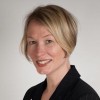
AfriAlliance lunch seminar at IHE Delft – connect and cooperate!
7 June 2018
In April, the AfriAlliance team at IHE Delft organised an institute-wide lunch seminar for colleagues to learn about the project and to find concrete ways forward for cooperation. Project Director Dr. Uta Wehn presented what AfriAlliance is all about, what we are doing at the moment and what the plans are for the coming months and years. The exchange that followed showed that there are many synergies between the work of IHE Delft and AfriAlliance. These will be further explored in the months to come.
An initial lunch seminar at the end of last year for the country coordinators of African and European countries within IHE Delft was well received, so this time the lunch seminar broadened to address all IHE Delft staff members. Uta Wehn presented ongoing project efforts such as the preparation of an AfriAlliance Massive Open Online Course (an introduction to Climate Change impacts on water resources in Africa), the first AfriAlliance Policy Brief on Strengthening the capacity of African stakeholders to achieve Sustainable Development Goal 6 amidst Climate Change, and the first set of Social Innovation Factsheets on monitoring water quality and quantity in Africa.
The lunch seminar was endorsed by IHE Delft’s Rector, Professor Eddy Moors. He stressed that for a project like AfriAlliance, it is important to build on the partnerships of IHE Delft to make the project sustainable in the long run. Also, he commented on the citizen science component of AfriAlliance (see for example the deliverable on the triple sensor approach) as being very relevant, since citizen science plays an increasingly important role in current debates – which is what the Ground Truth 2.0 project focuses on (also lead by Uta Wehn), including in Africa.
The discussion with IHE Delft colleagues focused on the involvement of other IHE Delft staff as well as the institute’s MSc students. How can AfriAlliance build on the knowledge available in the institute, and how can the MSc students play a role in the project? One suggestion was to introduce the students to the project during their regular classes. Also, it would be an option to link their MSc research projects to specific AfriAlliance activities, so that the MSc theses can fit into the AfriAlliance framework of better preparing African stakeholders for the impacts of climate change on water resources. Linking up with the institute’s MSc students also aligns well with the objectives of Young AfriAlliance. This recent initiative provides students and graduates with the chance to play an active role in a large scale project and to obtain skills that will be instrumental in their future careers.
Overall, the lunch seminar was a great way for the AfriAlliance team at IHE Delft to find synergies with the activities of their colleagues. For the IHE Delft staff, it was also a good opportunity to get to know the AfriAlliance project, to learn what we are working on and to explore possibilities for cooperation.
